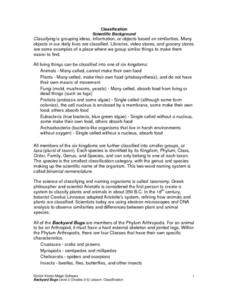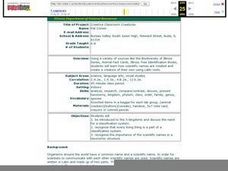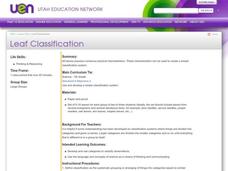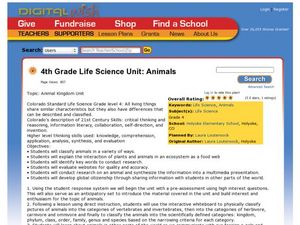Curated OER
Backyard Bugs
Explore the concept of scientific classification and the similarities and differences between plant and animal species. Your class will participate in hands-on activities by investigating dichotomous keys and classifying their shoes. To...
Curated OER
Hardware Sort
Students classify various hardware items using the attributes of the objects. In this classification lesson, students group objects based on their attributes and explain their classification key.
Curated OER
Creative Classroom Creatures
Students are introduced to the five kingdoms and discover why there is a need for a classification system. Using the internet, they examine how scientific names are created and practice putting animals into their correct classification....
Curated OER
Classification of Living Things
Pupils classify organisms according to the rules of taxonomy. In this biology lesson plan, students name organisms using binomial nomenclature. They create a new organism and explain which specific group it belongs to and why.
Curated OER
Kingdom: Fungi
The general characteristics of fungus types are presented here. Your class will love the pictures of the amazing features found on these strange living things. The internal and external structures and their functions are highlighted. By...
Curated OER
Leaf Classification
Seventh graders work together to develop a leaf classification system. In groups, they are given a set of leaves and sort them based on their characteristics. They share their new classification system with the class and answer any...
Curated OER
Classifying Objects
Fourth graders classify living things according to similarities and differences through guided and independent activities. They place objects into groups according to their characteristics and then make a collage of living things...
Curated OER
What's In A Name?
Students explore the concept of the binomial system of nomenclature for classifying organisms. Students travel on a field trip to observe organisms displayed and their common names. Students complete several classroom activities and...
Curated OER
At the Seaside
Encourage sorting and classification skills by asking, "What kinds of things are found at the seaside?" Kids sort objects by calling out the items found at the beach. They can choose from things like balls, dogs, bikinis, shells, and...
Columbus City Schools
Get Your Organisms Organized
From large to small, show your class how to organize them all! Included within the guide is everything you need to take their knowledge of classification from the cellular to the species level. The worksheets focus on building vocabulary...
Curated OER
Saving Big Cats from Extinction
Students explore extinction. In this biology and environmental science lesson, students define extinction, identify what living things need to survive, and create a persuasive poster about "saving the big cats" using a desktop...
Curated OER
Organizing Life
For this classification worksheet, learners will review vocabulary words associated with the organization of living things which includes kingdom, phylum, class, order, family, genus, and species. This worksheet has 5 fill in the blank...
Curated OER
Classifying Critters
In this classifying critters worksheet, students read a 1 page article on classifying living organisms and then answer 10 true or false, short answer, multiple choice or fill in the blank questions.
Curated OER
Look Up - Birds
Students investigate the concept of birds. They identify five different types of birds and name the characteristics that make them different than other living things. Students also name the different parts of the bird and how they are...
Intel
Insects: The Good, The Bad, The Ugly
What would the world be like with no insects? Ponder this question using a research-based STEM unit that encourages scholars to investigate insects from both a beneficial and hazardous perspective. They learn about insect behaviors,...
Curated OER
SORTING ALL SORTS
Students examine how the method of classification is used. In this sorting lesson students take a pre-test, classify organisms and complete a crossword puzzle.
Curated OER
Naming New Species
Learners explore science of taxonomy and the Five Kingdoms of life,
categorize organisms into Kingdoms, and create multi-media presentations illustrating knowledge of a Kingdom. They collect data and related pictures on the Internet,...
Curated OER
4th Grade Life Science Unit: Animals
Fourth graders classify animals. In this animal kingdom lesson, 4th graders research animal habitats and behaviors. Students connect to a zoologist via SKYPE and learn about animal classification. Students blog about preserving animal...
Curated OER
Scientific Classification
In this scientific classification worksheet, students read about classification and the questions scientists ask in order to classify, then read about features of different classifications of animals. Worksheet is informational, no...
Virginia Department of Education
Animal Phyla and Plant Divisions
Searched hours for an activity that allows individuals the ability to use multiple resources to learn about both plant and animal kingdoms? This discussion and activity provide pupils with the ability to visualize each organism before...
Curated OER
What It Is, What It Isn't
Third graders classify and sort different types of beans to be introduced to the classification system in science. As a class, they identify the characteristics of living and non-living organisms and make a chart in their journal to ...
Curated OER
Classification of Intertidal Organisma
Students categorize animals. In this animal classification lesson plan, students group animals by their characteristics. Students break into groups and work together to classify the animals. Students fill out a graphic organizer with...
Curated OER
Classification is Sweet
Students classify, weight and organize items during this lesson. This lesson works great as or with an introduction of the Periodic Table of Elements.
Curated OER
Spring
Young scholars examine lichens in an outside field trip. Students explore the diversity of this organism and ask questions about them.

























